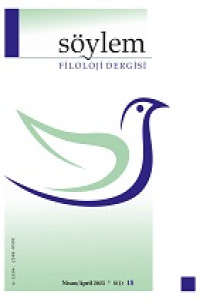Öz
Kentleşme, tüm dünyada toplumu ve dolayısıyla edebiyatı derinden etkilemiş bir süreçtir. Beraberinde getirdiği sosyolojik olgulardan biri de kentli milliyetçilik‘tir. Kavram, ortaya çıktığından beri sosyoloji, demografi ve ideoloji arakesitinde pek çok çalışmaya konu olmuştur. Öte yandan Türk toplumu da benzeri süreçleri yaşamış ve bu süreçler edebiyata yansımıştır.
Bu çalışmada kentli orta sınıf değerleri ve burjuvazinin periferiye bakışı bir roman örneğinde ele alınmıştır. Buket Uzuner’in olay örgüsü iki farklı zaman katmanı içinde geçen Gelibolu romanı (1999) betimsel analiz yöntemiyle incelenmiştir. Romanın olay örgüsünün birinci katmanının karakterleri doğu-batı çatışmasının temsilcileridir. İkinci katmanın karakterleri de merkez-taşra çatışmasının taraflarıdır. Yazar, romanın biraz Doğulu, biraz Batılı, biraz Balkanlı, biraz Kafkaslı, ama en çok Akdenizli olmayı önemseyen karakterleri üzerinden kentli üst kültürcü milliyetçiliği savunur. Dolayısıyla roman, hem 1960’ların Mavi Anadoluculuğunun bir devamı, hem de seküler milliyetçi ve Atatürkçü perspektifin bir yeniden üretimi şeklinde okunabilir.
Çalışmanın amacı, ele alınan roman örneğinde kentli milliyetçilik olgusunun anılan dönemin edebiyatına nasıl yansıdığını ortaya koymaktır. Öte yandan edebiyat ve sosyoloji arakesitindeki bu olguyu Türk romanları üzerinde ele ala alan herhangi bir çalışmanın bulunmaması çalışmanın önemini ortaya koymaktır. Öte yandan makale türünün sınırları gereği, ele alınan döneme dair yönelimleri tek bir roman ve bu romana uygulanan bir çözümleme yönteminin sağladığı bulgular üzerinden genellendiğini de ifade etmek gerekir
Anahtar Kelimeler
Kentli milliyetçilik doğu-batı çatışması merkez-taşra çatışması Postkolonyalizm Buket Uzuner. Urban nationalism east-west conflict center-perihery conflict Postcolonalism Buket Uzuner
Kaynakça
- Akbal, Oktay (1969). Tarzan Öldü, İstanbul: E yay.
- Akçura, Yusuf (1987). Üç Tarz-ı Siyaset. Ankara: Türk Tarih Kurumu.
- Anderson Benedict (1991), Imagined Communities: Reflections on the Origin and Spread of Nationalism. Londra: Verso.
- Argın, Şükrü (2006). “Taşraya İçeriden Bakmak Mümkün müdür?” Taşraya Bakmak, İstanbul: İletişim Yay., ss. 271-296.
Öz
Urbanization is a process that has deeply affected society and therefore literature all over the world. One of the sociological phenomena that it brings with it is urban nationalism. Since its emergence, the concept has been the subject of many studies at the intersection of sociology, demography and ideology. On the other hand, Turkish society has experienced similar processes and these processes have been reflected in literature.
In this study, the values of the urban middle class and the perspective of the bourgeoisie to the periphery are discussed in the example of a novel. Buket Uzuner's novel Gelibolu (1999), whose plot takes place in two different time layers, has been analyzed by descriptive analysis method. The characters of the first layer of the plot of the novel are representatives of the east-west conflict. The characters of the second layer are also the parties to the center-periphery conflict. The author defends urban supracultural nationalism through the characters of the novel who care about being a little Eastern, a little Western, a little Balkan, a little Caucasian, but mostly Mediterranean. Therefore, this novel can be read both as a continuation of the Blue Anatolianism of the 1960s and as a reproduction of a secular nationalist and Kemalist perspective.
The aim of the study is to reveal how the phenomenon of urban nationalism is reflected in the literature of the mentioned period in the novel example. On the other hand, the absence of any study dealing with this phenomenon in the intersection of literature and sociology on Turkish novels is to reveal the importance of the study. On the other hand, due to the limitations of the genre of the article, it should be noted that the orientations of the period in question are generalized through a single novel and the findings provided by an analysis method applied to this novel.
Anahtar Kelimeler
Urban nationalism east-west conflict center-perihery conflict Postcolonalism Buket Uzuner
Kaynakça
- Akbal, Oktay (1969). Tarzan Öldü, İstanbul: E yay.
- Akçura, Yusuf (1987). Üç Tarz-ı Siyaset. Ankara: Türk Tarih Kurumu.
- Anderson Benedict (1991), Imagined Communities: Reflections on the Origin and Spread of Nationalism. Londra: Verso.
- Argın, Şükrü (2006). “Taşraya İçeriden Bakmak Mümkün müdür?” Taşraya Bakmak, İstanbul: İletişim Yay., ss. 271-296.
Ayrıntılar
| Birincil Dil | Türkçe |
|---|---|
| Konular | Edebi Çalışmalar |
| Bölüm | EDEBİYAT / ARAŞTIRMA MAKALELERİ |
| Yazarlar | |
| Yayımlanma Tarihi | 27 Nisan 2023 |
| Gönderilme Tarihi | 3 Şubat 2023 |
| Kabul Tarihi | 18 Nisan 2023 |
| Yayımlandığı Sayı | Yıl 2023 Cilt: 8 Sayı: 1 |

This work is licensed under a Creative Commons Attribution-NonCommercial-NoDerivatives 4.0 International License.

